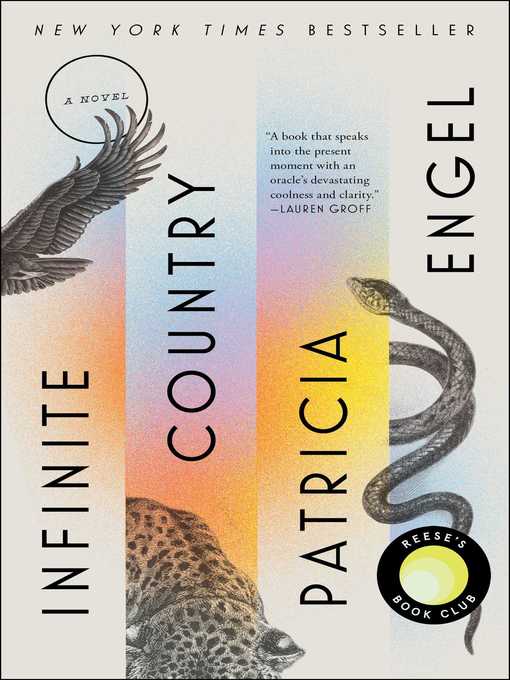
Infinite Country
A Novel
کتاب های مرتبط
- اطلاعات
- نقد و بررسی
- دیدگاه کاربران
نقد و بررسی

December 1, 2020
Fifteen-year-old Talia has a problem. She's stuck in a correctional facility for adolescent girls when she should be in Bogot� with her father, readying for a flight that will reunite her with her mother and siblings in the U.S. A memorable line--""It was her idea to tie up the nun."-- launches the narrative with the force of a cannon as it switches back and forth between the present and the past. The immigrant's story might be well-traveled ground, but Engel (The Veins of the Ocean, 2016) constructs a layered narrative outlining how the weight of every seemingly minor choice systematically cements into a crushing predicament. "They did not consider themselves immigrants. They never thought that far ahead and were young enough to believe none of their decisions were permanent." As Talia's parents, Mauro and Elena, migrate to the U.S., the fractured family tries to hold on to each other over the miles, even as their lives begin to unspool over parallel trajectories. Lively folktales of the Muisca peoples punctuate Engel's remarkable novel as it illuminates the true costs of living in the shadows. Told by a chorus of voices and perspectives, this is as much an all-American story as it is a global one.
COPYRIGHT(2020) Booklist, ALL RIGHTS RESERVED.

Starred review from December 21, 2020
Engel (The Veins of the Ocean) delivers an outstanding novel of migration and the Colombian diasporae. Talia breaks out of a reformatory for girls in Colombia with a single purpose: to reunite with her family in the U.S. Her parents, Elena and Mauro, fell in love as teenagers and had a child before fleeing from the violence, poverty, and uncertainty of Bogotá and moving to Houston, where “their ears took in English, English, all the time English, and if they heard Spanish, it was with no accent like their own.” After overstaying their visas, they have two more kids including Talia, the youngest, and move to various cities. But the family is separated when Mauro is deported for driving without a license. The narrative moves between past and present to chronicle Talia’s travails—first sent back to Colombia to live with her grandmother as a young girl, and later hitchhiking to Bogotá to meet Mauro—and the lives of Elena and Mauro, revealing the struggles of undocumented migrants and exploring “how people who do horrible things can be victims, and how victims can be people who do horrible things.” Engel’s sharp, unflinching narrative teems with insight and dazzles with a confident, slyly sophisticated structure. This is an impressive achievement. Agent: Ayesha Pande, Pande Literary.

January 1, 2021
A 15-year-old girl in Colombia, doing time in a remote detention center, orchestrates a jail break and tries to get home. "People say drugs and alcohol are the greatest and most persuasive narcotics--the elements most likely to ruin a life. They're wrong. It's love." As the U.S. recovers from the repeal of the Deferred Action for Childhood Arrivals program, from the misery of separations on the border, from both the idea and the reality of a wall around the United States, Engel's vital story of a divided Colombian family is a book we need to read. Weaving Andean myth and natural symbolism into her narrative--condors signify mating for life, jaguars revenge; the embattled Colombians are "a singed species of birds without feathers who can still fly"; children born in one country and raised in another are "repotted flowers, creatures forced to live in the wrong habitat"--she follows Talia, the youngest child, on a complex journey. Having committed a violent crime not long before she was scheduled to leave her father in Bogot� to join her mother and siblings in New Jersey, she winds up in a horrible Catholic juvie from which she must escape in order to make her plane. Hence the book's wonderful first sentence: "It was her idea to tie up the nun." Talia's cross-country journey is interwoven with the story of her parents' early romance, their migration to the United States, her father's deportation, her grandmother's death, the struggle to reunite. In the latter third of the book, surprising narrative shifts are made to include the voices of Talia's siblings, raised in the U.S. This provides interesting new perspectives, but it is a little awkward to break the fourth wall so late in the book. Attention, TV and movie people: This story is made for the screen. The rare immigrant chronicle that is as long on hope as it is on heartbreak.
COPYRIGHT(2021) Kirkus Reviews, ALL RIGHTS RESERVED.

























دیدگاه کاربران